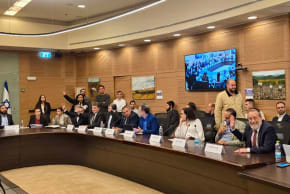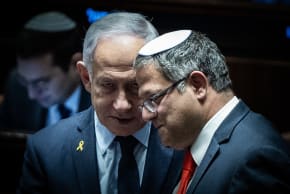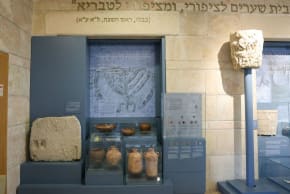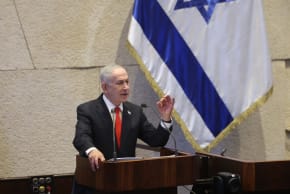Knesset
Israel faces national test as Supreme Court blocks Army Radio closure - opinion
Supreme Court blocks Army Radio closure, signaling a fight over press freedom and democratic checks in Israel.


Supermajority of Israeli Arabs support re-establishing Joint List for Knesset elections, poll shows

Israel advances bill for authority over West Bank heritage, archaeology sites

Baku Sephardic rabbi visits Knesset, highlights Azerbaijan commitment to Jewish community security
Farmers journey to Jerusalem to protest Smotrich's dairy reform after resuming milk supply
The protest comes after farmers resumed milk supply to dairies on Wednesday morning. They had halted the supply throughout Tuesday, leading to milk shortages.

High Court orders Netanyahu to justify keeping Ben-Gvir as minister
At the heart of the matter are claims that Ben-Gvir violated a series of agreements laid out between him and Attorney-General Gali Baharav-Miara on the limits of his involvement in police conduct.

Thousands of shekels deducted from reservists' salaries in 2025, Knesset panel discusses
The discussion was convened after reservists said the deductions were made following the implementation of a new salary mechanism in May 2025.

New archaeology exhibit marks 60 years of Knesset building with rare finds from Jerusalem, Galilee
The event hosted more than 2,000 visitors, including soldiers, police officers, Holocaust survivors, and students from schools and kindergartens across the country.

Israel's Knesset moves to try Nukhba terrorists as Phase I of Trump's Gaza plan ends
On Wednesday, a small forum will take place, with the participation of MK's Rothman, Malinovsky, Karin Elharar, Yoav Segalovitz, and Minister Yariv Levin.

Netanyahu warns Israeli democracy eroding, opposition boycotts ceremonial Knesset session
Netanyahu said Israel’s democratic balance has eroded at a Knesset ceremony marked by opposition boycotts and the absence of senior judicial figures.

Protests, courts, and control: Israel’s struggle for power and moral high ground - opinion
Street harassment is unacceptable when it targets the wrong people, power, not principle, explains the rage.

Knesset marks 60 years since building inauguration in traditional Tu Bishvat ceremony
The event celebrating Israel’s parliament is expected to host more than 2,000 visitors, including soldiers, police officers, Holocaust survivors, and students from schools across the country.

'Correct a historical injustice': Yair Lapid to table Knesset bill branding Qatar as 'enemy state'
Lapid plans to table legislation defining Qatar as an enemy state, accusing it of acting against Israel’s security interests, including by funding terror groups, such as Hamas.

Return of Arab Joint List takes seats from opposition while Likud strengthens - poll
The revived Joint List would win 13 seats, up from the 10 currently projected when the parties ran separately. The seats came at the expense of Yesh Atid, Naftali Bennett, and Gadi Eisenkot.
